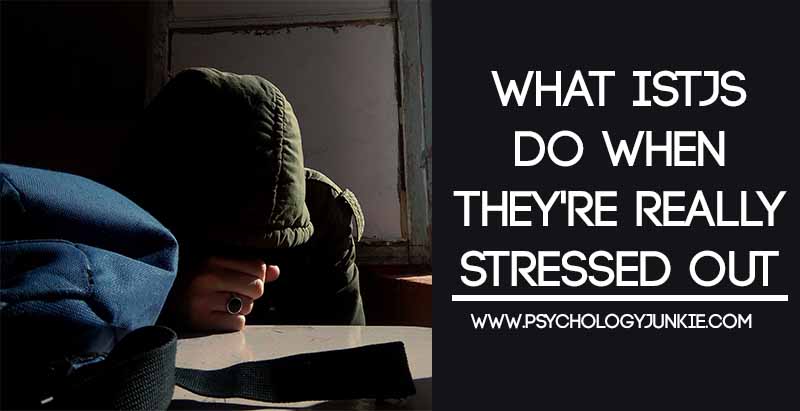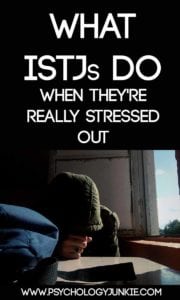What ISTJs Do When They’re Really Stressed Out
“Let your heart feel for the afflictions and distress of everyone, and let your hand give in proportion to your purse.”
– George Washington, ISTJ
When it comes to stress, we all handle it a little bit differently. Some of us want encouragement from a friend, others of us prefer to be left totally alone. ISTJs tend to be stressed by activities and stimuli that force them to use their non-preferred functions. For example, as sensing dominant types they might get stressed in conversations that dwell on theory more than fact for long periods of time. As thinking types, they might get overwhelmed in highly emotional atmospheres. Over the years I’ve spent an enormous amount of time studying type and stress, in fact, I’ve even written a book on the subject. In this article, I want to give ISTJs (or friends and partners of ISTJs) effective tools for managing stress and ways to know what stresses you in the first place! I hope this will be a help!

Not sure what your personality type is? Take our new personality questionnaire here. Or you can take the official MBTI® here.
First of all, what stresses the ISTJ?
- Being in a chaotic environment
- Looming deadlines
- Being given a task without a clear plan or direction
- Frequent change
- Having to innovate without any past experience to rely on
- Being forced into spontaneity
- Not enough alone time
- Emotionally charged situations
- Unfamiliar surroundings
- Dealing too long with abstract subjects
ISTJs enjoy the world of facts, experience, and interaction with the world around them. They enjoy reflecting on their experiences, putting together logical plans of action, and improving their communities. Many of their stressors don’t coincide with their dominant function: introverted sensing. Introverted sensing types like familiarity, they like being reminded of what’s provable, true, and what they’ve had personal experience with. Situations that force them to work in new, unfamiliar, or unusual surroundings can be stressful for them. Having to react spontaneously without time to prepare can make them feel anxious and overwhelmed at times. Some ISTJs grapple with this better than others, but most dislike unexpected change.
As thinking types, ISTJs enjoy the world of logic and objective truth. They can feel uneasy in situations where they are forced to rely on more emotionally-based logic. To them, emotions are largely irrelevant in decisions; facts can be trusted and emotions are very fickle friends. Being around people who are reacting emotionally can make them feel stressed because they don’t always feel they have the right words to say and their solutions are often met with frustration instead of favor.
How ISTJs Respond to Stress:
There are two kinds of stress ISTJs can experience: everyday stress and “grip” stress. Both have different reactions, so we’ll talk about them one at a time.
Everyday Stress
During everyday stress, ISTJs will become more extreme in their preferences, or true to type. They may become hyper-aware of the details around them or become obsessed with finding a logical way to solve a problem. They will try to pull as much energy from their dominant function, Introverted Sensing, as possible. Sometimes they can resolve the problem this way, other times they can’t, and this may cause them to wear out their dominant function. They may withdraw from others and feel the need to be alone until they can find a way out of their stress. This often results in them over-analyzing the situation that created the stress, looking for any missing details, and looking for logical solutions. If the stress isn’t able to be resolved, or if it is especially extreme, the ISTJ may fall into the grip of their inferior function.
“Grip” Stress
Grip stress usually occurs when the ISTJ is dealing with severe stress, chronic stress, or illness. Grip stress can happen when the ISTJ has overused their two favorite functions, sensing and thinking, and as a result has worn them out. It can also occur when the ISTJs inferior function, Extraverted Intuition, is “triggered” by having to deal with theoretical details, abstract information, or unexpected new situations too much.
When an ISTJ is experiencing grip related stress, they will seem very unlike their normal selves. When the inferior function takes over, the ISTJ often falls into “catastrophe mode” and will see nothing but all the ways that things could go wrong. They may beat themselves up over perceived mistakes or duties which they failed to perform. They may become intensely angry, impulsive in what they’re doing, outwardly critical, and pessimistic. In a grip state, the ISTJ can sense nothing but an overwhelming dread and fear of the future.
Keep in mind, an ISTJ experiencing a grip-related stress reaction is overwhelmed and confused. They may feel out of control or like they’re having an out-of-body experience. This is because their functions have reversed and they aren’t able to access their normally clear, logical thinking or focus on the accurate details. It’s important not to judge the ISTJ during these experiences.
7 Ways ISTJs Can Get Relief From Stress:
#1 – Get Some Alone Time
ISTJs NEED alone time when they’re stressed. This way they can clear their head, focus on the problem at hand, and not get depleted from social interaction and over-stimulation.
#2 – Cancel Non-Essential Responsibilities and Plans
Have an unnecessary dinner engagement? Said “yes” to too many little projects? ISTJs tend to be very responsible, helpful people, but sometimes they just need to take a break from it all. If there are some more insignificant responsibilities that they can let go of, they absolutely should.
#3 – Exercise
Exercise reduces stress for all personality types. It releases stress-reducing endorphins in the brain, reduces fatigue, improves alertness and concentration, and enhances overall cognitive function.
#4 – After Some Alone Time, Talk To a Good Friend
We’re not talking just any friend, either. ISTJs need to talk to someone who will listen, who won’t bombard them with ideas and advice, and who will empathize. Many ISTJs report that venting without feeling judged helps them to feel better. Others suggest that listeners “re-voice” what the ISTJ has said back to them and ask questions so that the ISTJ can get a better perspective of what they’re going through.
#5 – Remind Yourself of the Facts
What are the real and concrete facts of the situation? If an ISTJ is in a grip-stress phase, re-focusing on what is actual and real can be helpful. It also helps if they remind themselves of how they’ve faced situations like this before and lived through them or overcome them.
#6 – Ride the Wave of Negative Feelings
Introverted Sensing dominant types (ISFJs and ISTJs) often report that they need to just let the negative feelings pass through them before they can find any relief. They find that being alone and just letting themselves feel whatever it is they are naturally feeling, negative or positive, will eventually allow them to release their tensions and extricate themselves from the situation. They may feel terrible for a while, but they find that trying to “solve” the problem too quickly only makes things worse and prolongs their frustration.
#7 – Watch Your Favorite Movie
Some ISTJs report that they can find relief from grip-related stress by watching a favorite movie. This helps them to relax and get their mind off of trying to “solve” the problem. After the movie is over they can revisit the problem or stressor with a more balanced, composed energy.
All About ISTJs
What Are Your Thoughts?
Do you have any tips for ISTJs or other types? Let fellow readers know in the comments! Find out more about your personality type in our eBook, Discovering You: Unlocking the Power of Personality Type.
Other Articles You’ll Love:
The Childhood Insecurities of Each Myers-Briggs® Personality Type
10 Things You’ll Relate to If You’re an ISTJ
10 Things You Should NEVER Say to an ISTJ
Why You’re Lonely (Based on Your Myers-Briggs® Personality Type)














Very accurate and informative. Describes both SiFi loop and inferior grip. And the remedies are very helpful.
Thank you! So glad you enjoyed it 🙂
#6 – Ride the Wave of Negative Feelings is very accurate, it’s just like my fiance. As an ENTJ. I just wanna solve the issue and nip it in the butt. But she’ll want to be alone and come back later and be perfectly fine, which is so weird to me.
#6 – Ride the Wave of Negative Feelings is very accurate for my fiance. As an ENTJ, I will want to nip the problem in the butt, but she will want to be alone. Then she will come back like it never happened. It’s pretty weird to me.
I just found out I have a ISTJ personality type and before that I thought the blunt-facts-driven personality was just me by myself. I recently went through a stress filled couple of months and I didn’t know how to handle it since all the advice I was receiving did not completely work out for me, because of all the emotional theoretical basics part of them all. Thank you for the article, this feels like a good stress-reliever that could work out better.